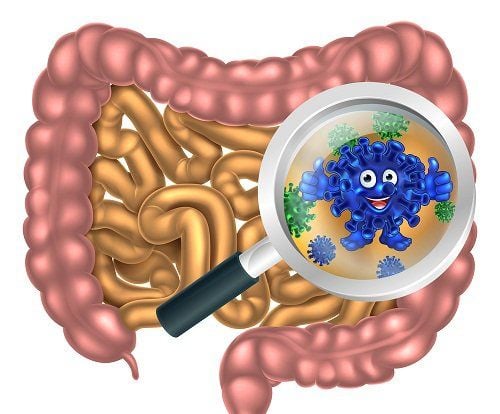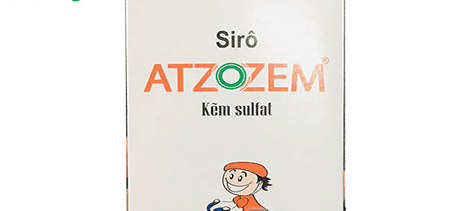This is an automatically translated article.
During the digestive process, normally nutrients from food will be absorbed in the small intestine into the blood and transported to the organs to perform physiological functions to maintain life as well as ensure growth. growth and development of the body. But in children with poor absorption of nutrients, this mechanism works poorly, leading to significant effects on children's health.1. What is nutrient malabsorption in children?
When we give children healthy foods, the body automatically absorbs nutrients and vitamins from them. However, in children with malabsorption of nutrients, even though they still eat normally, their digestive system cannot absorb the nutrients in food.This is a digestive problem that is not uncommon and greatly affects the health of children. In particular, in infants with poor absorption of nutrients, the child's body will fall into a state of deficiency of some important nutrients to support the body's development.
Proteins, vitamins and minerals, if not absorbed, will directly affect the development and functioning of organs in the body. More importantly, children with poor nutrient absorption can suffer serious complications such as fractures and are at increased risk of infection.
Also, this digestive problem can lead to symptoms like bloating and diarrhea.
MORE: Malabsorption syndrome and digestive disorders

Khi chúng ta cho trẻ ăn những thực phẩm có lợi cho sức khỏe, cơ thể sẽ tự động hấp thụ các chất dinh dưỡng và vitamin từ chúng
2. Causes of poor absorption of nutrients by children
There are many "culprits" that make children poor absorption of nutrients leading to slow weight gain, they can directly or indirectly affect the child's digestive tract. Here are some common causes of nutrient malabsorption in children as indicated by nutritionists:2.1. Children's daily diet lacks micronutrients. Children who have to eat solid foods too soon or do not eat according to the schedule are easy to fall into a state of poor absorption of nutrients. For foods with complex molecular structures or highly allergenic (including: egg whites, seafood,...), if children under 9 months of age are not trained by their mothers, gradually lead to malabsorption.
Besides, the cause of poor absorption of nutrients in infants also comes from the diet. Specifically, children with an unbalanced diet of 4 food groups and loaded with fatty foods can also lead to digestive disorders in children. Not only that, if the child's body lacks necessary micronutrients for the digestive system such as calcium, zinc, magnesium, ... will cause anorexia, anorexia, and loss of appetite.
Therefore, the child's diet is very important because without a proper diet, the child's digestive system will be "overloaded", thereby affecting the digestive function and nutrient absorption.
2.2. Intestinal dysbiosis Intestinal dysbiosis is a condition in which the intestinal microflora becomes unbalanced. This condition is also the cause of reducing the efficiency of nutrient absorption in children.
2.3. Digestive disorders In the first years of life, a child's digestive system is still incomplete, so the child's immunity is still weak, so it is easy to suffer from digestive disorder syndrome.
2.4. Enzyme deficiency When there are enzymes or digestive enzymes (existing in the salivary glands, liver, pancreas, etc.), food will be converted into nutrients more easily. The deficiency of endogenous digestive enzymes will affect the absorption of food in the intestinal tract of children.
MORE: Learn about intestinal malabsorption syndrome
2.5. Due to pathology For children with liver, pancreas, gallbladder or gastrointestinal diseases such as peptic ulcer disease, enteritis, irritable bowel syndrome or children treated with radiation therapy, bowel surgery, ... can also fall into a state of malabsorption of nutrients.
In addition, lactose intolerance is also a cause for children to have difficulty absorbing nutrients.

Loạn khuẩn đường ruột là một trong số nhiều nguyên nhân gây hấp thu chất dinh dưỡng kém ở trẻ em
3. Symptoms of poor absorption of nutrients
Children with poor nutritional absorption, if prolonged, affect their physical and intellectual development. In particular, the weakened immune system of children easily makes them susceptible to infectious diseases. Therefore, parents need to know the early signs of poor absorption of nutrients in children to promptly handle and help children quickly improve their condition:Children have abdominal pain, nausea and vomiting. vomiting; Occurrence of diarrhea or watery stools (with a large amount); Weak resistance, children susceptible to infections; Signs of weight loss or very slow weight gain; The skin is dry, easy to bruise even with a light touch; Mood swings, fussy and irritable. In children who are absorbing nutrients, chronic (or ongoing) diarrhea is a very common symptom. Therefore, parents should take the child to see the doctor if the child has the above symptoms.

Trẻ kém hấp thu dinh dưỡng nếu kéo dài ảnh hưởng đến sự phát triển thể chất của trẻ
4. Complications in children with malabsorption of nutrients
For infants with malabsorption of nutrients, if they are not supplemented with nutrients as well as vitamins and minerals in time, the body may experience some serious complications, including:Fractures; High risk of infection; Children with slow weight gain and slow growth; Certain nutrients are important and necessary for building a healthy immune system. If a child's body cannot absorb these important vitamins and minerals, health can be seriously affected.
Children's malabsorption of nutrients is a very common condition today. Since there are many reasons for this condition, treatment also depends on the cause of the syndrome. If the child shows signs of malabsorption of nutrients, it is recommended to take the child to a specialist doctor to receive appropriate advice. In the case of children with prolonged anorexia, malabsorption, and growth retardation, parents should supplement children with supportive products containing lysine, essential micro-minerals and vitamins such as zinc, chromium, selenium, and B vitamins. help meet the nutritional needs of children. At the same time, these essential vitamins also support digestion, enhance nutrient absorption, help improve anorexia, and help children eat well. Parents can simultaneously apply dietary supplements and functional foods derived from nature for easy absorption. The most important thing is that improving your baby's symptoms often takes a long time. Combining many types of functional foods at the same time or changing many types in a short time can make the baby's digestive system unable to adapt and completely not good. Therefore, parents must be really patient with their children and regularly visit the website vimec.com to update useful baby care information.













